brave enough is a newsletter about finding balance between technology, nature and modern life. Join the club ❤️🔥
I’m so over the rampant online pathologizing of AI. There haven’t been this many doomsday vibes afoot since people were filling their baths with water at the turn of the millennium.
Granted, the amount of public discourse about AI is understandable. Any technological advancement of this magnitude is bound to prompt a global response. The big question remains: are AI cyborgs coming to steal our jobs and make our art?
Let’s investigate.
I find the best way to overcome my fear of something is to learn as much as I can about it. No matter what your current profession or sentiments on AI, I highly encourage you to spend some time learning how it works. For instance, do you know what the ‘GPT’ in ChatGPT stands for?
Generative Pre-trained Transformer.
Yeesh, that’s a crunchy jumble of words, so let’s break it down further:
Generative = the technology is able to create sentences, paragraphs, or even entire documents by predicting and producing words in a sequence.
Pre-trained = the technology is pre-trained on vast amounts of pre-existing data. This means that it has already learned patterns, structures, and information from diverse sources before being fine-tuned to support with specific tasks.
Transformer = the clever part. The technology is designed to process sequential data, like language, by efficiently capturing relationships between words or tokens in a sequence. This helps the AI model understand which words are most relevant to each other, allowing it to focus on key information, even when words are far apart in the sentence, replicating human-like intelligence.
A high level understanding of concepts like LLMs, RAG, GANs, AI agents and AI native products can not only be enlightening, but also calm some of the nerves you may harbour about these new technologies. I’ve included some links to educational videos and articles about AI at the bottom of this post.
AI’s impact on human jobs will take two forms: automation and augmentation. Automation involves using AI to perform tasks that were previously done by humans, typically without human intervention once the system is set up. This could include routine tasks such as data entry or solving basic customer service inquiries. Augmentation refers to AI systems that enhance human capabilities by assisting with or supporting complex tasks, without fully replacing the human role. Examples include supporting doctors to analyse test results or helping lawyers to summarise masses of legal documentation. In a nutshell, AI is particularly primed to take over data-heavy and algorithmic tasks.
So, which jobs are on the chopping block? Data entry, basic customer service representatives, legal assistants, bank tellers and other professions will likely phase out or change drastically in the next 5-10 years. Just like how local and international direct dialling replaced the need for switchboard operators, widespread adoption of AI is going to kill certain jobs. There is a natural ebb and flow to the world of work which means that not all jobs last forever.
I could go on about how AI will create more jobs (which it will) or about how it will make quintessential human skills like negotiation, leadership, empathy, and relationship-building more valuable (which it will), but that isn’t what this essay is about. Instead, I want to venture into the space where AI and art meet.
The furore surrounding AI in the creative community was triggered by ChatGPT’s breakthrough use case: content generation. I cringe as much as the next person whenever I read LinkedIn updates or blog posts written exclusively in clunky ChatGPT-lish. Suddenly, all of my online platforms were awash with professionals and creatives bemoaning the fact that AI has irrevocably destroyed content.
Excuse my French, but I really think we need to calm the fuck down. Tools like ChatGPT are still in their early days. I’m pretty sure that we will look back on our current overuse of AI generated content in the same way as we look back on the now-extremely-unfunny memes of the early internet:
AI content will saturate our online spaces for a while. Let’s just accept it and be patient, because it won’t last forever. As Mike Mearls put it in this great post: “We’re at the point in the 90s when everyone is adding “.com” to the end of their logo in hopes of catching the wave. That wave will peak, the bubble will burst, we’ll deal with the headaches of a few quarters of recession, and the dumb money will flow out. The nimble mammals who are left behind will then get to the business of applying the tech to actually useful ends.”
AI generated art is also experiencing a naissance. This one seems to be a particularly touchy subject, which again is understandable. Artists spend decades perfecting their craft, only for a machine to be able to spit out detailed graphics and videos in seconds. In a world of already precarious employment, that is threatening. I found this post by a watercolour artist very interesting. Their dilemma: art director of a French magazine they used to work for decides they will now use AI to illustrate all of the magazine’s articles. How does the artist feel about this AI-generated watercolours? “They weren’t good or bad. They just represented one less artist getting a job.”
It begs the question: can AI-generated or AI-augmented art be considered art?
The above photograph by Annika Nordenskiöld won an award at the prestigious Ballarat International Foto Biennale in Australia last year. Accolades like this fan the flame of debate as to whether machines can generate art. The artist herself made the following statement: “None of the places, people or creatures in my prompts exist in the physical realm. They were conjured from the sum of human experience in our deep collective well, as seen from my dreamboat with its flickering light.” I find Nordenskiöld’s photograph arresting and uncomfortable; I couldn’t take my eyes away for several seconds. Isn’t that what art is in its purest sense - a transmission of emotion from the artist to the viewer?
AI, like a pencil or a can of spray paint, is no more than a medium to create art. It feels wrong for anyone to categorically decide what is an artistic medium and what isn’t. I personally think it would be ridiculous to suggest that technological advancements can’t count as art.
How artists choose to embrace AI is fascinating to watch. Last year, one of my long-time favourite musicians, Grimes, launched elf.tech - an AI voice generator which mimics her singing voice free of charge. She urged fans to go wild, promising to split royalties 50/50 on any successful AI generated song that used her voice.
It’s not all smooth sailing. One of my favourite bands, 1980s new wave outfit Tears for Fears, are currently facing a lot of backlash for choosing to design the cover of their upcoming album ‘Songs For A Nervous Planet’ using AI. The comments on their Instagram are, to put it lightly, overwhelmingly negative. Is there anything more chronically 2024 than using AI to generate the cover for an album you’ve called ‘Songs For A Nervous Planet’, and then getting cancelled for it?
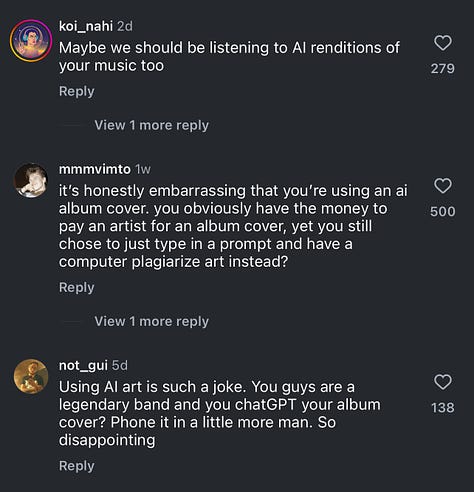
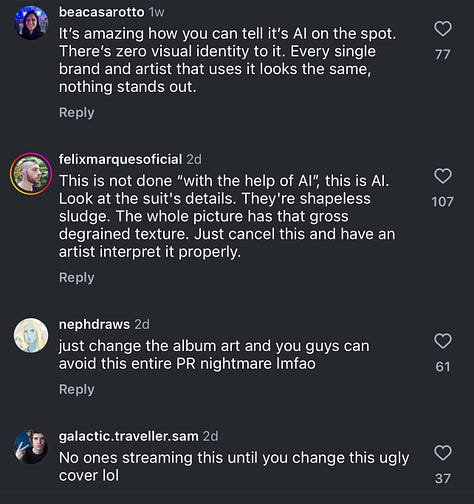
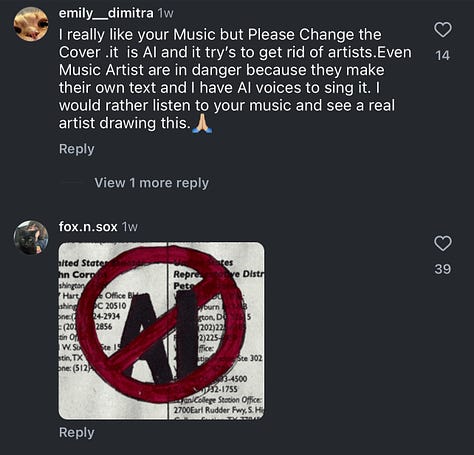
I’m just going to say it: these black and white responses have a similar energy to the “foreigners coming here and stealing all our jobs” take peddled by the far right. I don’t think this is helping anyone. I believe there is a middle ground where AI and art can not only co-exist but even complement each other.
Unless you’ve been surfing the internet under a rock, you’ve probably seen this tweet:
This really did the rounds on LinkedIn, but for me it totally misses the point. AI isn’t going to take over all forms of art and writing. Do I think that AI will replace the need for people to write basic website content and listicles? Eventually, yes. Do I think that AI will replace all forms of copywriting and writing? Absolutely not. AI is not sitting around making art and writing things by itself. AI feels zero joy from creating art and writing, and this is fact is critical to remember.
I think that AI will make the human touch even more valuable. Investment in craftsmanship and skill means playing the long game, but it’s something that wins out almost every time.
I’m pretty sure that it’s already possible for AI to generate deep fake footage of the entire Olympics. AI could create athletes and have them perform mesmerising physical feats. If this is possible, then why don’t we just scrap the existing Olympics and Paralympics? Why waste time, money and effort on the whole spectacle?
Because there’s a reason why we are inspired by watching skilled athletes compete in sporting competitions. There’s a reason why people queue outside Edinburgh’s Lannan bakery for three hours to buy a cardamom bun. There’s a reason why people spend the cost of a house on a vintage car, even when fancy new self-driving cars exist. There’s a reason why there are several comic book and graphic novel stores here in Berlin, despite the medium being eclipsed by cartoons and Pixar animations. There’s a reason why people still buy hand-knit cardigans that are several times the cost of one off the rack from Zara. There’s a reason why we have museums filled with old paintings that are guarded around the clock.
While technological advancements may change our world, I don’t believe that AI will ever change what makes us human. Art and creative expression look different depending on who you ask: woodwork, dancing tango, live brass bands, gardening, ceramics. Human beings are born creators who enjoy tangible things. For centuries, we have assigned value to and protected craftsmanship.
This might seem like a very romantic view of the problem, and I don’t mean to trivialise the disruption that AI is causing. I am sure that people who make a living as freelance copywriters or translators are sweating right now. My point is that we always seem to predict the worst possible outcome, when things probably won’t play out in the way we expect. Call it toxic positivity, but I just don’t subscribe to the belief that the value of human-generated art and writing will be eroded by AI.
A recent article in the Guardian highlighted the fact that both CD and live concert sales are on the rise, despite the plethora of streaming services and HQ video at our fingertips. I find this super inspiring. The driving force behind this phenomenon is that people want to “own” art again, rather than having their collections tied to streaming service subscriptions. Meanwhile, growing discontent over the plight of smaller musicians and labels fighting for survival on homogenous platforms like Spotify and Tidal have pushed fans to connect with and support their favourite artists via live concerts, merch and other avenues. We need to give humanity more credit: people like, relate to and want to support other people and their creations. I really believe a similar movement will happen with other forms of art and writing.
I’m currently writing a novel. The pursuit of publishing a book has been a lifelong passion project. Now, I could ask ChatGPT to write my novel for me, but then it wouldn’t be my novel. I’m no zealot though. I do use AI to support my writing in a way that doesn’t involve creating even a sentence of prose. There are thousands of ways to use AI as a creativity tool. I deploy AI in my novel writing process to help me think through the emotions of my characters, analyse plot holes or double-check grammar. If I have writers block on how a character would react to something, I ask ChatGPT it to generate ten different ways the character could possibly respond. Spoiler: none of the generated answers are ever what I want. However, this method has - to this day - never failed to spark an idea of what I do eventually end up writing. This is one of my best tips for getting out of a writer’s block funk! I think purist attitudes get us nowhere and are actually limiting to what is possible creatively, which is why it makes me uncomfortable to see artists being vilified for experimenting with AI in their work.
The book Everyday Millionaires by Chris Hogan explores the results of the largest study ever conducted on US millionaires, with over 10,000 participants taking part. The book dives into the habits, behaviours, and financial strategies of these super-wealthy individuals. One of the most shocking findings of the study was that many millionaires tend to spend their time on simpler, hands-on activities such as farming and woodworking after accumulating significant wealth. This is yet another interesting data point to back up the fact that people naturally gravitate towards and value creative pursuits.
While AI may soon surpass the power of the human brain and open up quantum computing possibilities we never thought possible, it’s important to take these developments with a pinch of salt. The speed of AI is undeniable. Its smartness is still debatable. Do yourself a favour and remind yourself that your art occupies an untouchable space. Art is not about intelligence or speed. Art is about emotion.
Humans crave the friction that true craftsmanship brings to the table: the groves of a handmade ceramic, the static scratch of a record, the brushstrokes on an original painting, words on a page that move you to tears. I believe that the value of human-made art will only grow as our world becomes more digitised and optimised. What’s more, AI and other technologies could open up new possibilities to add human flourish to experiences and services which, until now, have been gradually eroded to save costs. Maybe with AI taking care of some of the dirty work, people will start to pay a premium for humanity.
Further reading and watching on AI
PS: I attempted to use AI to generate the cover image for this post but it’s output was a steaming pile of garbage. I personally think my attempt has a certain je ne sais quoi.
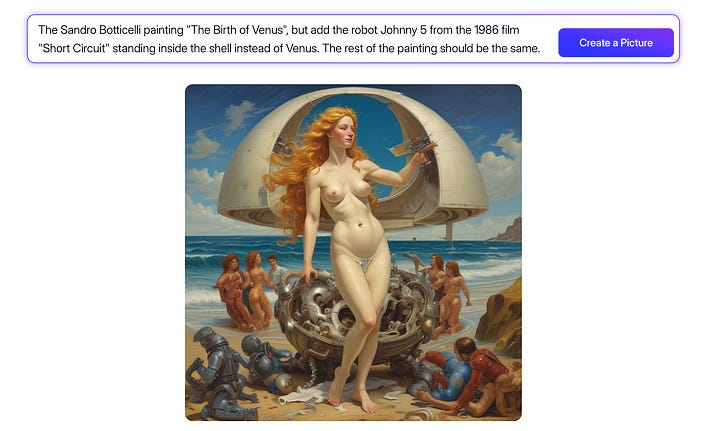
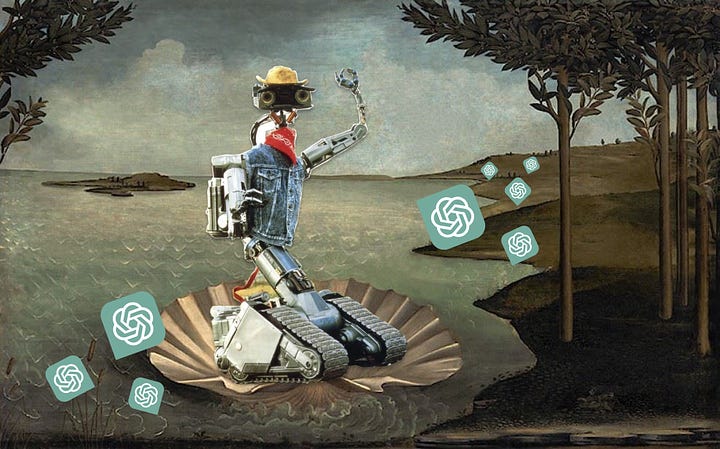





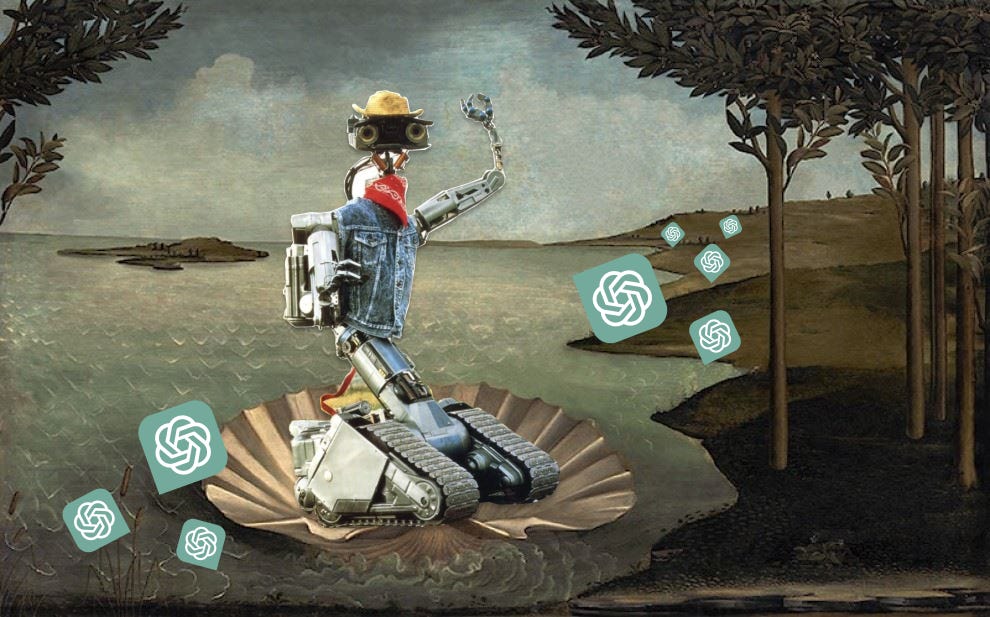
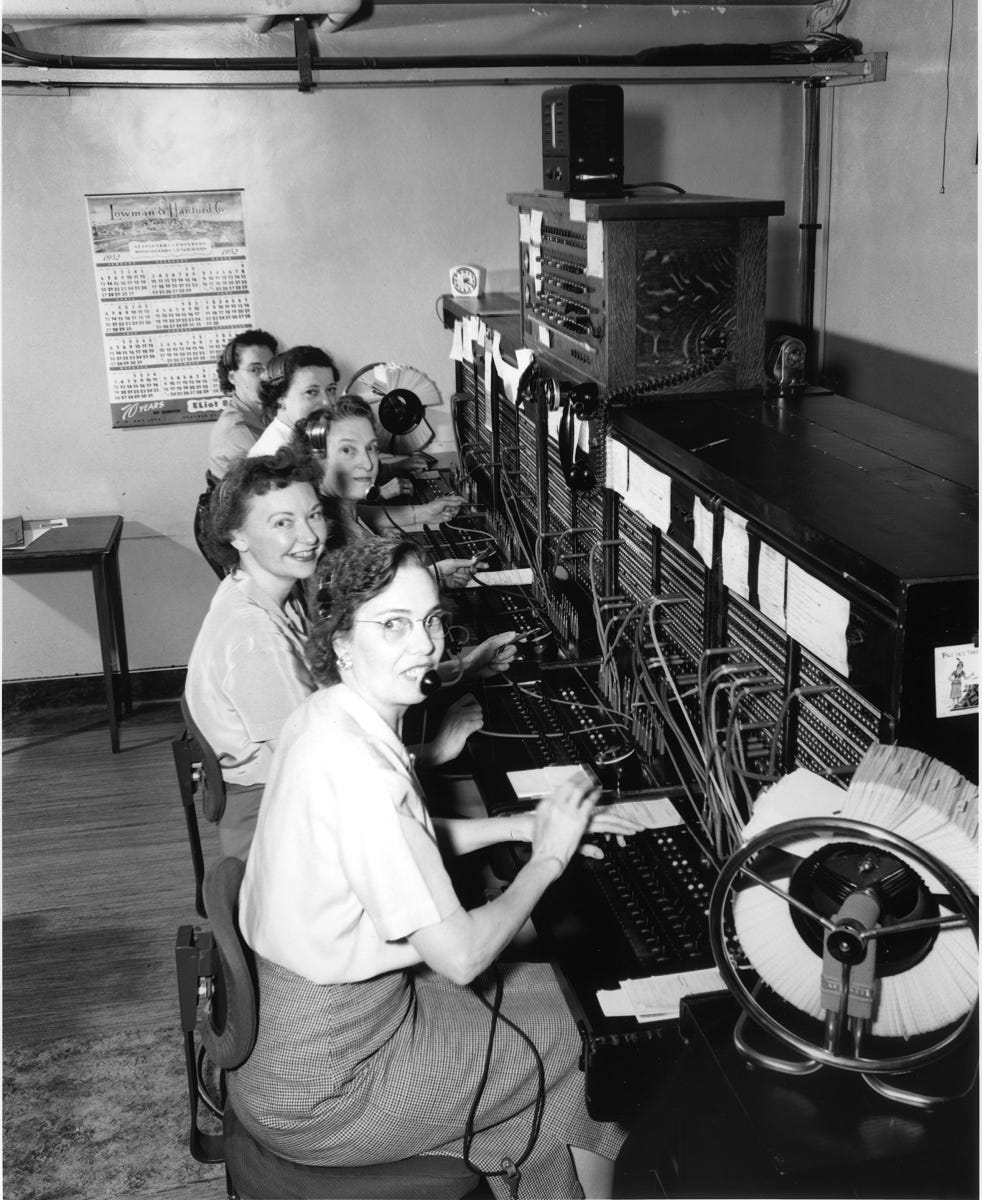
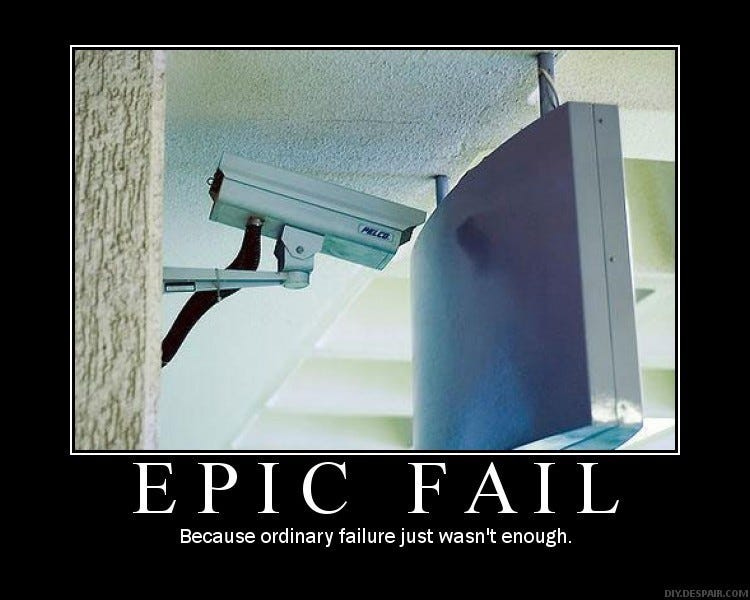
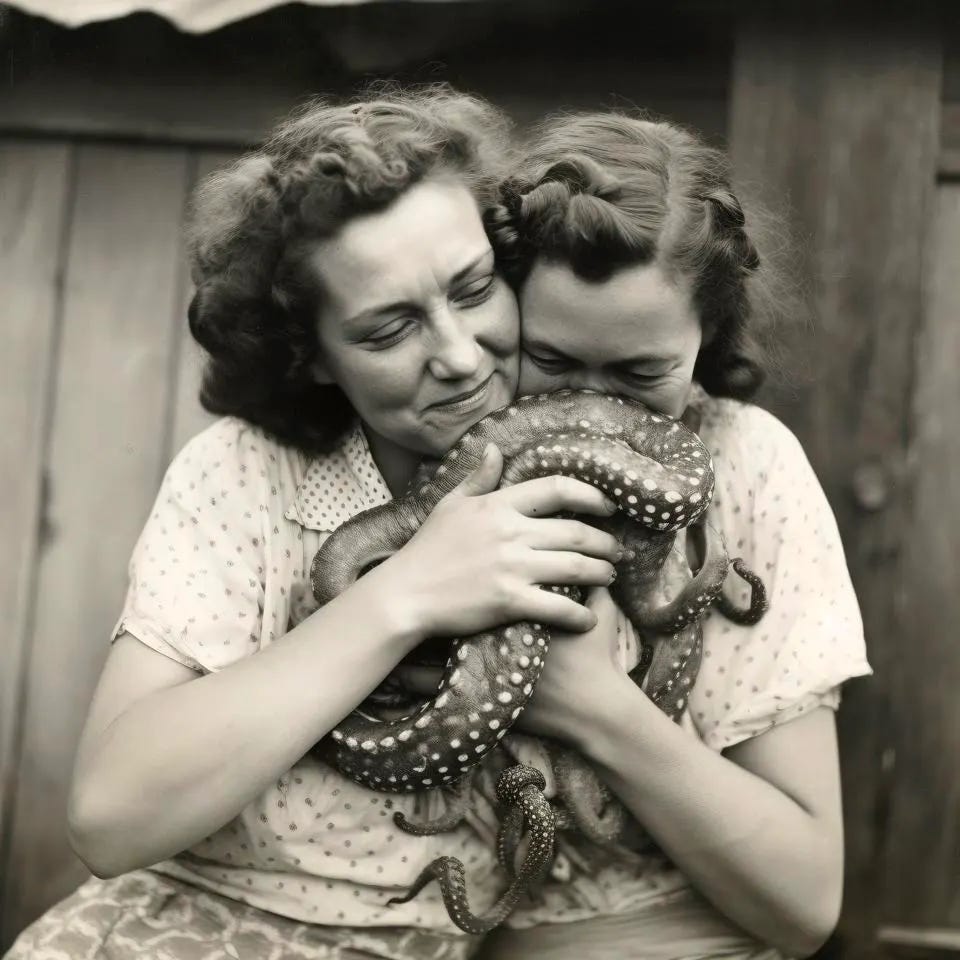
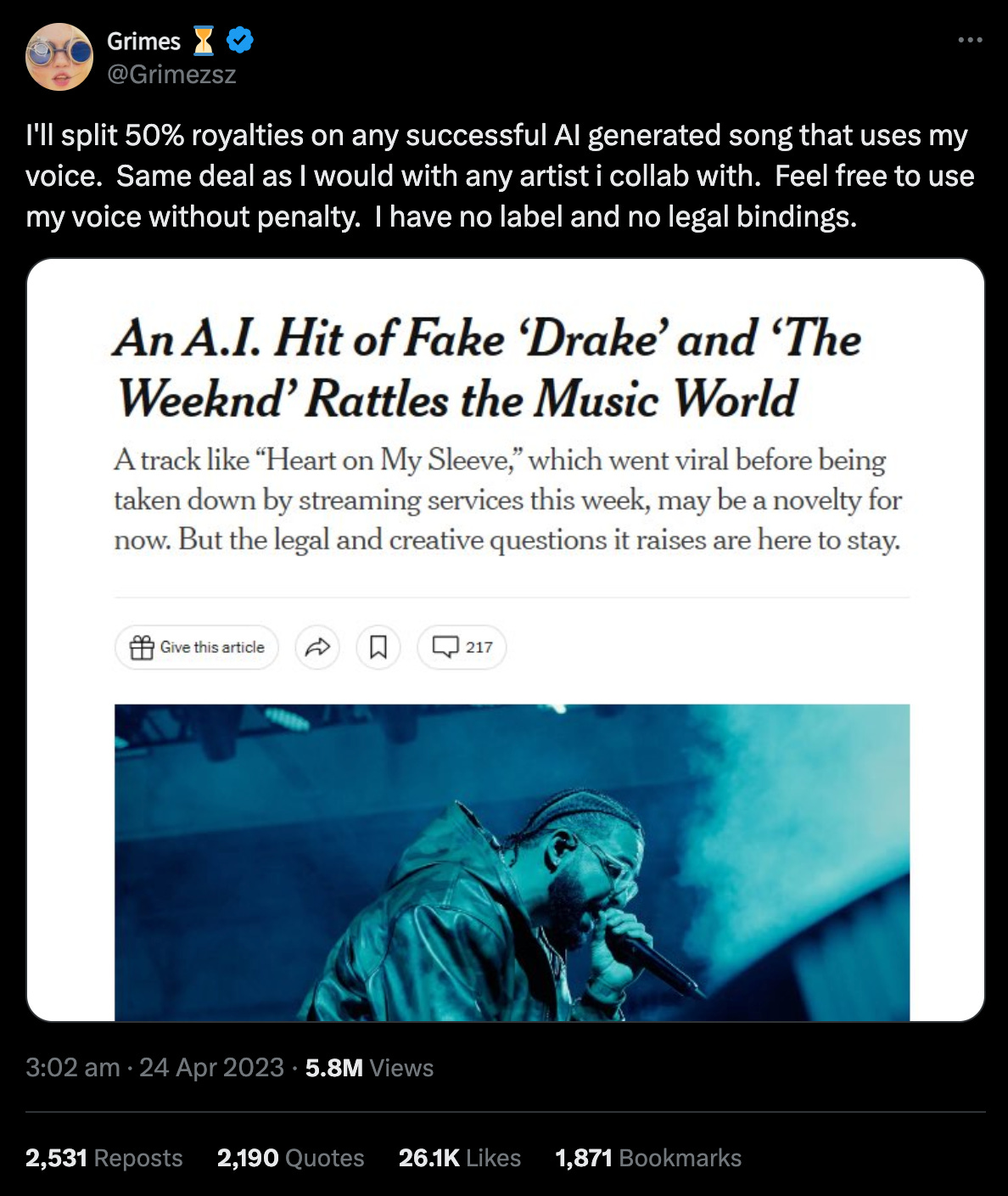
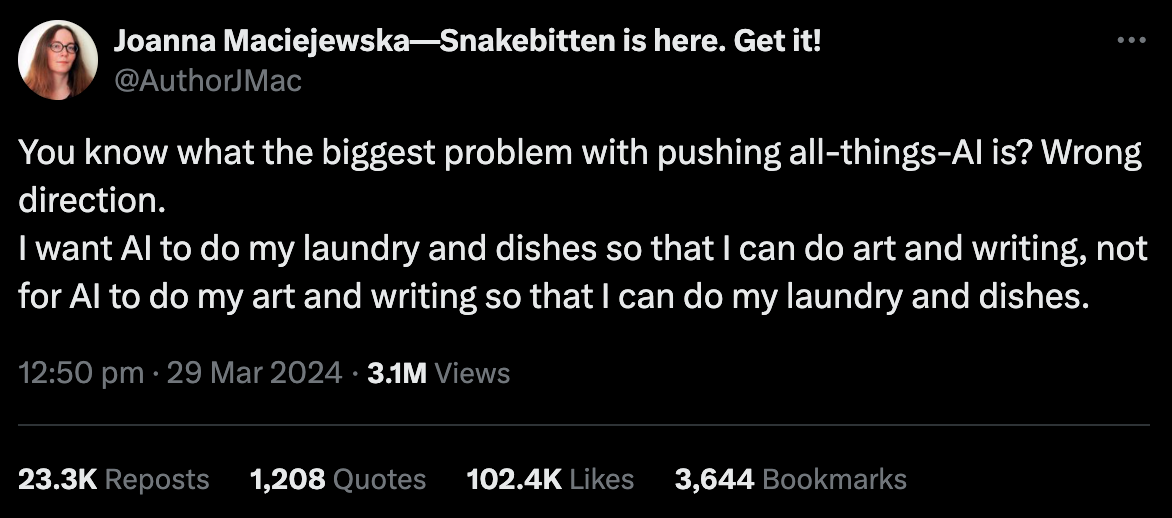
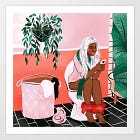


Johnny 5 is alive!! 😍 Excellent essay, and so nice to see an optimistic take on AI for once! I don't know if you've listened to Ezra Klein's podcasts on the topic, but my favourite AI anecdote is that ChatGPT outputs less content in December compared to other months of the year, and the only explanation they can come up with is that it has somehow internalized that December = holidays = less work 🤯
lovely article, and i couldn't agree more. Some jobs are bound to disappear because that's what big tech always does and the world adapts, and i'm glad the more mind-numbing jobs are getting replaced (as they should tbh for having done them for a while) i remember a conference i went to a few years ago about the future of ai and art and it basically said that ai would provoke a big economical shift in the job market, creating more jobs in the creative industry as we will have more free time on our hands and more time to digest media it was quite interesting